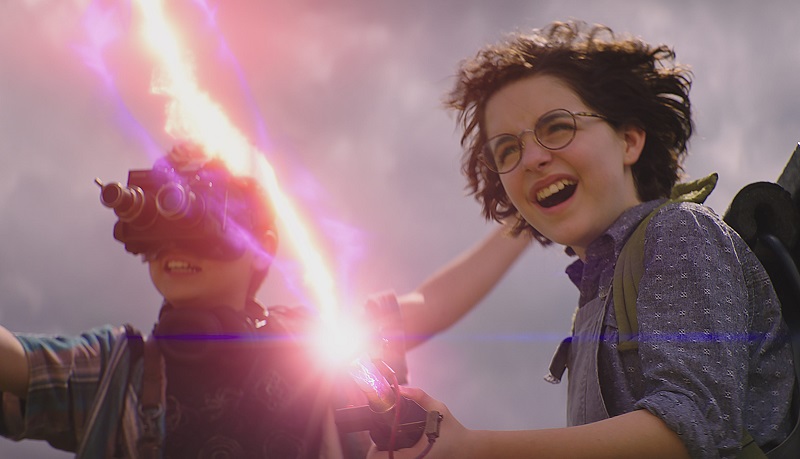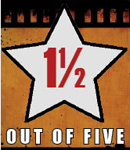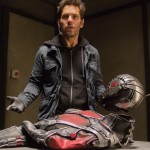

Remember when a bunch of manbabies whined about The Last Jedi, and Lucasfilm oversteered while attempting to course-correct with The Rise of Skywalker and slid right off the road? Yeah, Ghostbusters: Afterlife is like that, but somehow even worse. (Maybe that's because we were already used to occasionally getting a terrible Star Wars movie, while all the Ghostbusters sequels to this point had at least been adequate entertainments.)
Say what you will about Ghostbusters '16 (a.k.a. Lady Ghostbusters), but that movie is pretty funny and has a strong sense of its characters (even if its plotting feels like a half-written afterthought). Ghostbusters: Afterlife fails to meet either of those goals. And rather than even bothering to attempt its own story, it cuts and pastes the plot of the 1984 Ghostbusters into a framework that's awkwardly trying to shift the tone of the franchise while still making room for the OG Ghostbusters to show up for a glorified, ill-fitting cameo. Afterlife is also designed to sentimentally honor the late Harold Ramis at the same time it's directly tying into the original, decidedly unsentimental film. There are so many competing agendas at play that the whole thing ends up feeling like a discordant mess.
Conceived, co-written, and directed by Jason Reitman, an often interesting filmmaker who just so happens to be the son of original Ghostbusters director Ivan Reitman, Afterlife opens with a partially obscured Egon Spengler trying to trap a spectral entity on a rural farm that immediately offers a contrast to the New York setting of all the other films. Ramis sadly died in 2014, so some care had to be taken with how to include his character in the story. At the end of the prologue, Egon dies too, though as the word "ghost" is right the in the title, it's fair to assume his part in the story doesn't end there.
A week later, Egon's estranged and broke daughter, Callie (Carrie Coon), and his grandkids, Phoebe (Mckenna Grace) and Trevor (Finn Wolfhard), move to his dilapidated farmhouse to collect their inheritance. Callie really just wants to grab the silverware and run, but being as the family was just evicted from their city apartment, the three don't have much of a choice other than to settle in for a while. Despite being wildly intelligent, the eccentric Phoebe is enrolled in summer school, where she finds a kindred spirit in her offbeat teacher (Paul Rudd), an egghead wannabe scientist who's investigating the strange, possibly paranormal earthquakes that have been plaguing the small Oklahoma town. The whole thing has a strong Stranger Things vibe, where the kids try to find their place in this new community before running head-first into a series of bizarre, otherworldly occurrences — ones that will lead to them uncovering their grandfather's legacy, taking on the ghostbusting mantle, and eventually bumping into a few familiar faces.
In theory, I'm fine with Reitman and the powers-that-be changing up the tone by making a kid-centric legacy sequel that feels more like an '80s Amblin movie than a direct descendant to the original slobs-vs.-snobs comedy. But, unfortunately, none of Afterlife's new additions to the universe really work. Rudd and Coon play glossed-over, barely-there characters who are eventually just forced to assume the roles of two of the movie's many, many franchise callbacks. Grace and Wolfhard both have impressive screen presences for actors of their age, but they're just not given enough good material to carry the movie. There are also two other kid characters: Lucky, a teen girl devoid of a single personality trait, and Podcast, who has already locked down the award for the most annoying child character to show up in a movie released this year. (I shit you not, his nickname is actually "Podcast" and he carries a large microphone everywhere he goes.) Say what you will about Stranger Things, but at least the kid characters in that show feel like real people.
If you squint you can see some good intentions at play here, but they're buried so deeply under the slathering of lazy, "remember that thing you liked?" storytelling that they barely register at all. Afterlife so nakedly and embarrassingly reuses the mythology and plotting of the original film that it sabotages its own ambitions. Seeing those same beats hit over and over again in Afterlife's final act leaves the movie itself feeling like one of the franchise's own ghosts — a bloated apparition of a series that's likely taken its last creative breath.











